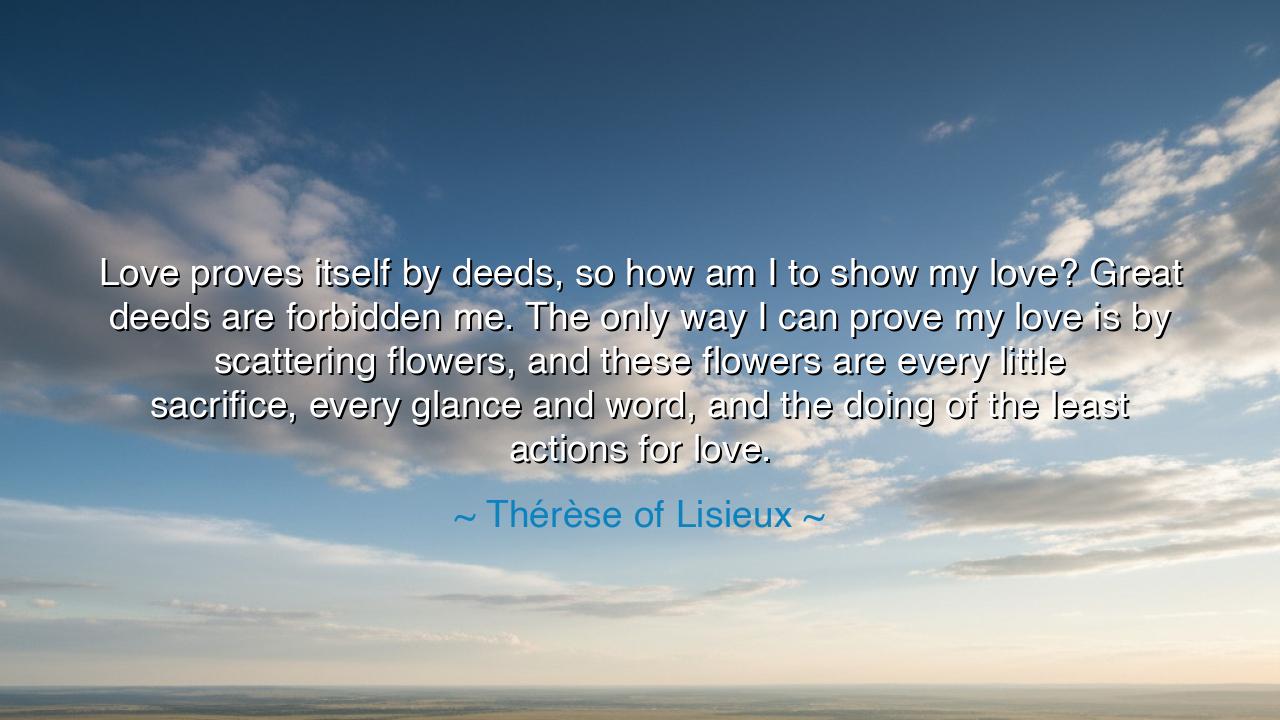
Love proves itself by deeds, so how am I to show my love? Great
Love proves itself by deeds, so how am I to show my love? Great deeds are forbidden me. The only way I can prove my love is by scattering flowers, and these flowers are every little sacrifice, every glance and word, and the doing of the least actions for love.






In the gentle yet luminous words of Thérèse of Lisieux, we hear a truth that pierces through time: “Love proves itself by deeds, so how am I to show my love? Great deeds are forbidden me. The only way I can prove my love is by scattering flowers, and these flowers are every little sacrifice, every glance and word, and the doing of the least actions for love.” These words, tender as dawn and powerful as prayer, reveal a mystery that the proud often overlook—that love, in its truest form, is not measured by grandeur, but by devotion in the smallest things. For in the eyes of Heaven, a whispered kindness may shine brighter than a king’s conquest, and a simple act done in love may echo longer than any deed of glory.
The origin of this saying lies in the heart of Thérèse herself, known to the world as “The Little Flower.” Born in France in 1873, she entered the Carmelite convent as a young girl, hidden away from the world’s acclaim. There, she longed to serve God in mighty ways—to be a saint, a missionary, a martyr—but the confines of the cloister allowed her no such path. And so, in divine wisdom, she discovered the “Little Way”: to do small things with great love. Her flowers were not petals from a garden, but moments of compassion, patience, humility, and quiet sacrifice. She saw that every smile offered through pain, every task done without complaint, every gentle word to a weary soul could be a blossom laid at the feet of God.
Her teaching is a song against the vanity of the age. The world exalts heroes of conquest, creators of empire, and masters of wealth. But Thérèse reminds us that the kingdom of love is built differently. Its foundations are hidden. Its victories are silent. Its heroes are those who forgive without being asked, who labor without reward, who love even when unseen. She shows us that great deeds are not always available to us, but love always is. The measure of one’s soul, therefore, lies not in what one accomplishes, but in the spirit with which it is done.
Let us remember the story of another soul who lived this truth—Mother Teresa of Calcutta. Surrounded by suffering beyond imagining, she often said, “We can do no great things, only small things with great love.” She did not build cathedrals or lead nations, but her every act—washing wounds, comforting the dying, speaking softly to the abandoned—became a cathedral of mercy. Like Thérèse, she scattered her flowers of love one by one, until the fragrance of her deeds filled the world. What both women knew, and what the wise have always known, is that love’s power does not lie in spectacle, but in sincerity.
Every little sacrifice, Thérèse says, can be an offering of love. To the hurried heart, this may seem too small to matter. But the ancients knew otherwise. They taught that a single drop of water, falling steadily, can wear away stone. So too can every small act of kindness carve paths of grace through the hardest hearts. The gentle hand that lifts a fallen child, the word of encouragement given to one in despair, the patience shown to a difficult soul—all these are flowers scattered upon the path of life. Their beauty is invisible to most, yet seen by the Eternal.
But make no mistake: this “Little Way” is no easy road. It demands humility, constancy, and courage. It asks us to find holiness not in applause, but in obscurity—to endure, to love, and to serve when no one watches. In a world that praises might, to choose gentleness is a quiet rebellion. To respond to cruelty with compassion is an act of strength greater than any sword. Thérèse teaches us that the true victory of love is not to be admired, but to keep loving even when the heart is weary, even when the gesture seems small or meaningless.
The lesson, then, is clear: Do not wait for greatness to show your love. Begin where you stand. Every moment, every breath, offers a chance to scatter your flowers—through gratitude, through patience, through a smile freely given. Let your daily acts become prayers, your words become petals of kindness. In your home, your work, your friendships, let love be the hidden thread weaving beauty into the ordinary. For in time, the world will see that it is not the mighty, but the merciful, who keep the light of goodness burning.
So, beloved soul, remember the wisdom of Thérèse of Lisieux: that every glance of love, every gentle word, every small act done with sincerity, builds a bridge between earth and heaven. Scatter your flowers daily—softly, silently, joyfully—and though the world may not see them, God will. And in the end, it is these humble blossoms that will outlast empires and echo through eternity, proving that the smallest deed, when done in love, is the greatest of all.






AAdministratorAdministrator
Welcome, honored guests. Please leave a comment, we will respond soon